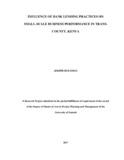| dc.description.abstract | This study sought to investigate the influence bank lending practices on small-scale business performance in Kenya. Specifically, the study established how banking rates, loan insurance, loan product marketing and loan security influenced performance of small scale businesses in Trans-Nzoia County, Kenya. The move to focus on this study was caused by the recent move by central bank to list some of the banks in Kenya in terms of their cost of lending and other practices, which led to the proposition of capping interest rates as provided in the Banking Amendment act 2016. Apart from that, business performance in Kenya was unstable with the majority of player citing lack of technical information regarding bank-lending practices. The study focused on selected financial institutions, which had branches in Kitale, Trans-nzoia County. Some of the theories that supported the study included the modern portfolio theory, theory of money, and relationship between interest rate as proposed by Keynesian school of economic thought. The study used survey research design; it adopted the use of stratified and random sampling methods to identify 352 both in the banking sector and in the small-scale business sector in Trans-Nzoia County. The study adopted the use of structured questionnaires to collect data from the two groups; banks sector and small-scale business sector. After data collection, it was analyzed using SPSS version 16 and thereafter presented results in tables as shown in chapter four. From the results presented, it was clear from 23 out of 45 respondents (majority) from banks stated that low bank rates encouraged lending institutions to lower the cost of credit hence encourage small-scale business operators to secure loans. Out of 300 respondents from small-scale business group, 131 respondents strongly agreed that the loan application was complex and that insurance firms had to be involved. In another case, 202 respondents accepted that they were trained on saving and credit techniques by financial institution as a way of loan product marketing; however, they still lacked knowledge on loan products. From the banks point of view, 18 respondents stated that loan security did not greatly influence the ability of small-scale business operators to secure loans. It was recommended that, the government should reconsider amending the banking act 2016, which caped interest rates at which banks charged borrowers. Furthermore, loan product marketing should be done effectively because it determine the choice of the loan product. | en_US |



